
24 Feb, 2017
Will ITB Berlin 2017 be the last?
Bangkok – Is anyone in the travel & tourism industry aware that in 1917, exactly 100 years ago, Europe was in the third year of World War I. It was also a game-changing year. The tide turned against the Central Powers (mainly Germany, Austria-Hungary and the Ottoman Empire) with the entrance of the U.S. That war ended in November 1918, killing an estimated 16 million combatants and innocent civilians.
In January 1920, the League of Nations was formed to prevent the world from sliding into more conflict. Barely had Europe completed its rebuilding, in 1939, a merely 19 years later, an even more devastating conflict started. By the time World War II ended in 1945, up to 85 million people had perished, including millions wiped out in concentration camps and two atomic bombs.
For what? What was so important for those who started those wars to generate a conflict that eventually killed more than 100 million young people, civilians, women and children? Was it land? Money? Oil? Water? What did anyone gain from causing such immense and immeasurable human suffering?
Both wars had one thing in common: They began with a drumbeat of nationalism, ethnocentrism, racial supremacy, jingoism, vilification and hatred. In pursuit of their early 20th century jihad, the warmongers in both Europe and Japan invaded countries, triggered mass genocide and caused destruction that took decades to rebuild.
In 2017, it is déjà vu in Europe and across the world. The rise of nationalistic, neofascist parties spewing out the same hatred and xenophobia as a certain Adolf Hitler. Amnesty International Secretary-General Salil Shetty wrote in his introduction to the human rights watchdog group’s 2016/17 report: “2016 saw the idea of human dignity and equality, the very notion of a human family, coming under vigorous and relentless assault from powerful narratives of blame, fear and scapegoating, propagated by those who sought to take or cling on to power at almost any cost.”
He recounted a global roundup of how tin-pot dictators around the world had indulged in their usual round of crackdowns on democracy and dissent. Now, eve the United States has joined the bandwagon. Lamented Mr. Shetty: “On the political stage, perhaps the most prominent of many seismic events was the election of Donald Trump as President of the USA. His election followed a campaign during which he frequently made deeply divisive statements marked by misogyny and xenophobia, and pledged to roll back established civil liberties and introduce policies which would be profoundly inimical to human rights.”
Mr. Shetty added, “Donald Trump’s poisonous campaign rhetoric exemplifies a global trend towards angrier and more divisive politics. Across the world, leaders and politicians wagered their future power on narratives of fear and disunity, pinning blame on the “other” for the real or manufactured grievances of the electorate.”
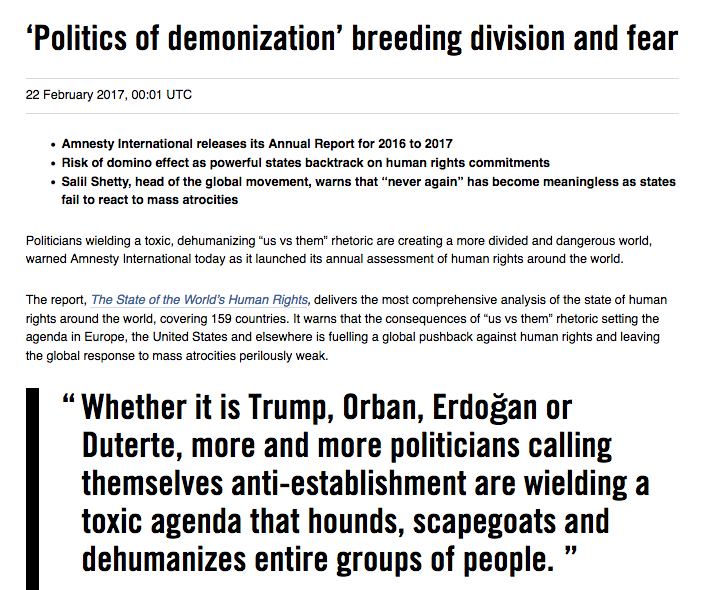
Speeches made just a few days ago at the Munich Security Conference 2017 show clearly that the geopolitical pot is boiling.
In his foreword to the Munich Security Report, Conference Chairman Ambassador Wolfgang Ischinger wrote, “The international security environment is arguably more volatile today than at any point since World War II. Some of the most fundamental pillars of the West and of the liberal international order are weakening. Adversaries of open societies are on the offensive. Liberal democracies have proven to be vulnerable to disinformation campaigns in post-truth international politics. Citizens of democracies believe less and less that their systems are able to deliver positive outcomes for them and increasingly favor national solutions and closed borders over globalism and openness. Illiberal regimes, on the other hand, seem to be on solid footing and act with assertiveness, while the willingness and ability of Western democracies to shape international affairs and to defend the rules-based liberal order are declining.
He added, “The United States might move from being a provider of public goods and international security to pursuing a more unilateralist, maybe even nationalistic foreign policy. We may, then, be on the brink of a post-Western age, one in which non-Western actors are shaping international affairs, often in parallel or even to the detriment of precisely those multilateral frameworks that have formed the bedrock of the liberal international order since 1945. Are we entering a post-order world? How this question will be answered in the years to come will depend on all of us.”
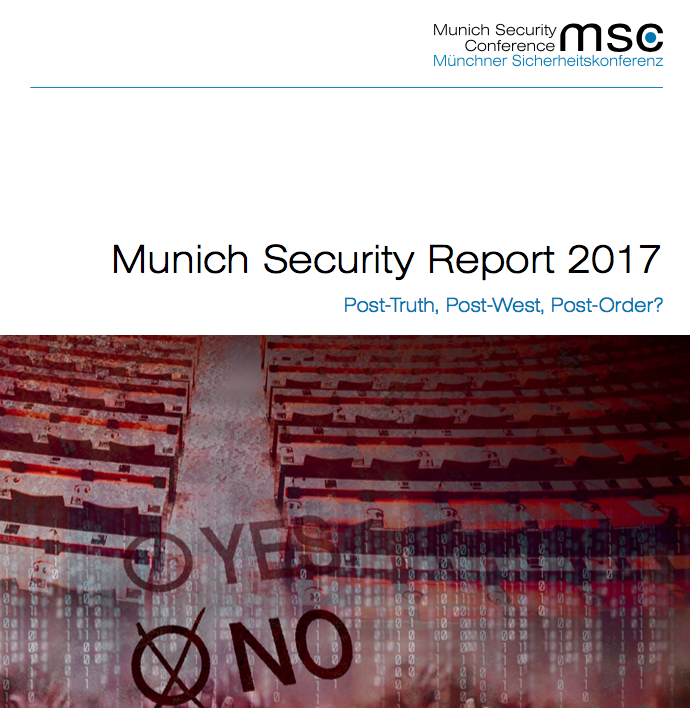
In his speech at the Munich Security conference, Mr. António Guterres, the UN Secretary-General and former Prime Minister of Portugal, said frankly, “We live in a dangerous world.”
Mr. Guterres delivered a brilliant speech drawing upon his background as a European who had led his country in the days of both a bipolar and unipolar world. He made an earnest effort to comprehensively trace the numerous root causes of global instability, e.g., the global power struggle amongst the big powers, the fragility of states, the massive violations of international humanitarian law and huge suffering, displacement of populations, and the direct and indirect involvement of outside states in domestic conflicts. These conflicts were exacerbated by other pressing problems such as climate change, population growth, chaotic urbanization, food insecurity, water scarcity and youth unemployment.
He also blamed the asymmetric effects of globalization which he said has been an incredible generator of wealth but has also led to “excessive inequalities”. The subsequent frustration in turn has “undermined the confidence between peoples and public opinion and their political establishments, and also the confidence in relation to international organizations.”
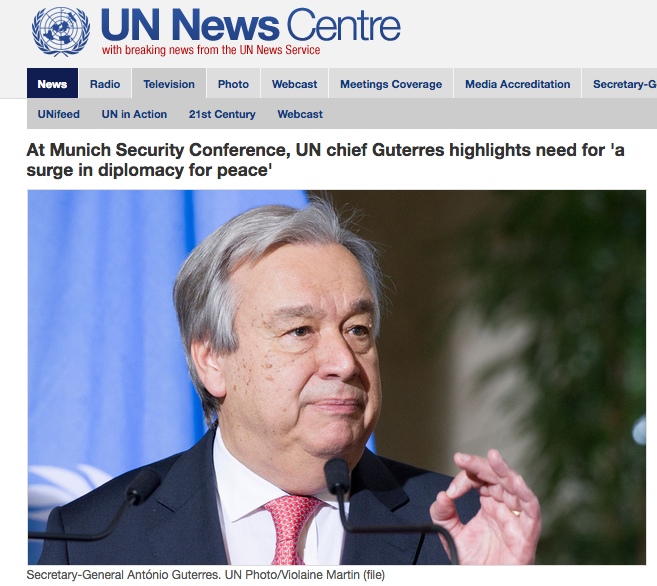
Mr. Guterres cited the communication gap between political societies and civil societies, noting that “flow of communication has an impact on the political decisions and an impact on the change of that action that might be necessary in political decisions.” Moreover, the enormous speed of communications has forced more short-term thinking, affecting the capacity of countries, governments and institutions to have long-term strategies. He stressed, “One of the worst worrying symptoms of today’s difficulties in the world is that there are so few countries that show the capacity to present a long-term strategy in relation to their own objectives.
At the same time, he said, this complex combination of inter-linked challenges has led to “a lack of confidence of people in relation to multilateral institutions,” and here he specifically cited the European Union and the United Nations.
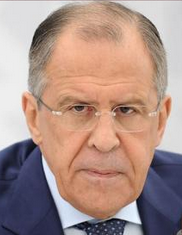 Russian Foreign Minister Sergey Lavrov |
Russian Foreign Minister Sergey Lavrov said, “Humanity stands at a crossroads today. The historic era that could be called the post-Cold War order has come to an end. Its main result, as we see it, was the complete failure of the Cold War institutions to adapt to new realities. The world has become neither ‘Western-centric’, nor a safer and more stable place. This is evident in the results of ‘democratisation’ in the Middle East and North Africa, and in other places too.”
By contrast, U.S. Secretary of Defense Jim Mattis blamed Russia and of course, the Islamic world. He said, “As guardians for our nations and as sentinels for new threats, we all see our community of nations under threat on multiple fronts as the arc of instability builds on NATO’s periphery and beyond. Unified by these growing threats to our democracies, we possess strong resolve. We’re going to adapt the alliance.”
While there was no disagreement about the state of the world, there was plenty of disagreement about the solutions. The Americans, as usual, favoured a military option. Gen Mattis said. “The United States is moving units into the Baltic states, Poland, Romania and Bulgaria, under Operation Atlantic Resolve.” It has joined the forces of United Kingdom, Germany and Canada, in Poland and the Baltic states. All of this, Gen Mattis said, “is a wholly defensive deployment to maintain deterrence.”
All of this is going to cost billions of dollars. The American solution: The Europeans must “carry their proportionate share of the necessary costs to defend our freedoms and we are committed to passing those freedoms intact to the next generation.”
The Russian Foreign Minister offered an alternative approach. He noted that the global model to create “the so-called ‘liberal world order… was pre-programmed for crisis right from the time when this vision of economic and political globalisation was conceived primarily as an instrument for ensuring the growth of an elite club of countries and its domination over everyone else. It is clear that such a system could not last forever.”
He urged, “Leaders with a sense of responsibility must now make their choice. I hope that this choice will be made in favour of building a democratic and fair world order, a post-West world order, if you will, in which each country develops its own sovereignty within the framework of international law, and will strive to balance their own national interests with those of their partners, with respect for each country’s cultural, historical and civilisational identity.”
He also called for a “dialogue on all complex issues in order to find mutually acceptable compromises. Actions based on confrontation and the zero-sum-game approach will not cut any ice. Russia is not looking for conflicts with anyone, but it will always be in a position to uphold its interests.”
Perhaps the greatest disagreement on solutions came between the U.S. Vice-President Mike Pence and the U.N. Secretary-General.
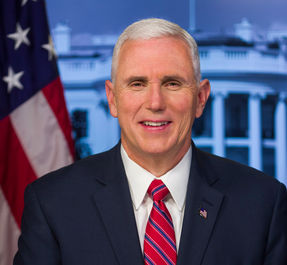 U.S. Vice-President Mike Pence |
Mr. Pence focussed nearly his entire speech on fighting “radical Islamic terrorism” and the need for more military solutions. He said, “Peace only comes through strength. President Trump believes we must be strong in our military might, able to confront any and all who would threaten our freedom and our way of life. We must be strong in our conviction that our cause is just and that our way of life is worth defending. If we lose the will to do our part to defend ourselves, we jeopardize our shared heritage of freedom.”
He added, “Under President Trump’s leadership, I can assure you, the United States will be strong — stronger than ever before. We will strengthen our military, restore the arsenal of democracy, and working with many of the members of the Congress who are gathered here today, we’re going to provide our soldiers, sailors, airmen, Marines, and Coast Guard with renewed resources to defend our nation and our treaty allies from the known threats of today and the unknown threats of tomorrow. As we speak, the United States is developing plans for significant increases in military spending to ensure that the strongest military in the world is stronger still.”
Mr. Guterres, by contrast, did not see a military solution. He talked of the need for a surge in diplomacy for peace, with the UN, under his leadership, being “an added value in that surge, acting as a catalyst, sometimes a convener, but always as a bridge-builder and an honest broker.” He noted, “It will not be easy. We will also need a lot of preventive diplomacy, a lot of efforts in mediation, and we especially need to have a strategy to address the root causes of these kinds of conflicts in the world.
“There are things that are obvious: the alignment of the sustainable and inclusive development with the sustaining peace agenda. It is clear that development is an important element in the prevention of conflicts, especially if it is inclusive and sustainable. It is clear that we need to address the fragility of states and to support states, institutions, civil societies, to become stronger, more resilient that will help diminish the tendency for states to be involved in conflict situations.”
Adopting the principle of charity beginning at home, he unveiled plans to reform the UN system itself. His three point agenda was as follows:
1) Shift more and more resources to prevention and peace-building;
2) Reform the UN development system which is “too fragmented” and needs “coordination and accountability” with independent capacity of evaluation to measure the performance of UN agencies in meeting the various objectives, especially the Sustainable Development Goals.
3) Internal management reform of the UN system, especially the rules and regulations of the UN to boost flexibility, simplifications of procedures, decentralization of decisions, and transparency and accountability.
Put the entire package of comments together, and it is clear that the world is at a dangerous crossroads. So is travel & tourism. Which raises the next question: What does travel tourism, the so-called “Industry of Peace”, plan to do about it? Does it favour the U.S. solution, or the U.N. solution? Is it mature enough to recognise the looming threats? Unlike the view of the World Travel & Tourism Council, tourism cannot be separated from politics. Tourism is the first beneficiary of good politics and good governance and the first victim of the opposite.
The UN World Travel Organisation, whose Secretary-General Dr Taleb Rifai sees tourism as a conduit for making the world a better place, may want to pick up the cue offered by his boss, Mr. Guterres, thus: “Understanding the people, understanding their concerns, their anxieties and fears, and caring for them, and trying to find solutions for them is absolutely essential to re-establish the confidence between political establishments and populations.” Travel & tourism is ideally placed to be the bridge-builder in that context, and offer a global platform for those concerns, anxieties and fears to be expressed.
The ITB Berlin, which begins on March 8, is located in a formerly divided city that was for many years a symbol of two devastating wars. Today, the same conditions that triggered both wars exist in some shape or form. The mercurial maniac in the White House is being prepped for a fight. All he needs is a “spark” such as the one that set off World War I and history will repeat itself.
This time it will be the mother of all wars.
And either the ITB Berlin 2017 or 2018 will probably be the last.



Liked this article? Share it!